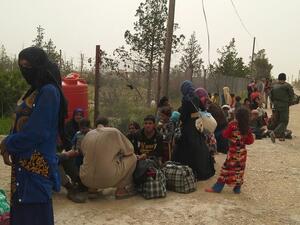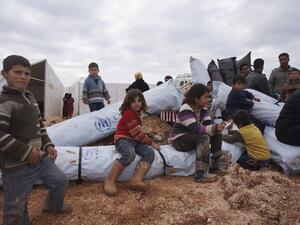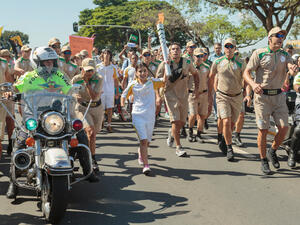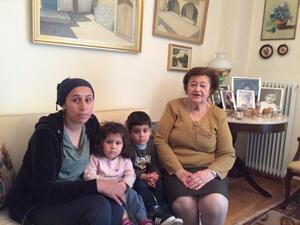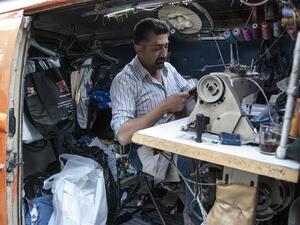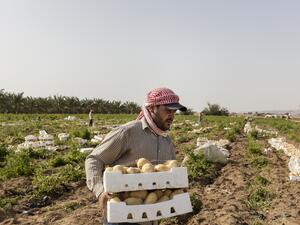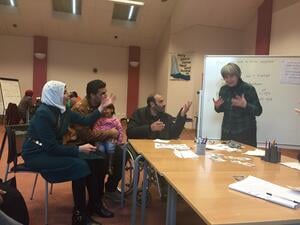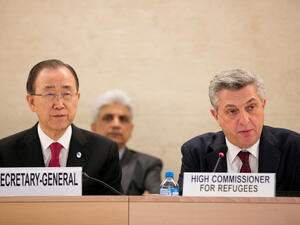UNHCR's helping hand for pregnant refugees and others in need of care
UNHCR's helping hand for pregnant refugees and others in need of care

Sixteen-year-old Iman cups her growing belly with her hands. She fled Syria when it became too dangerous and difficult to find food. The child, a girl, is due in a few weeks.
BEIRUT, Lebanon, March 18 (UNHCR) - Amid the sadness of war there is good news for 16-year-old Syrian refugee, Iman.* Her baby lives.
The teenage mother fled her hometown of Dimniyet El Cham some three months ago when the shelling of her neighbourhood became too intense and food for herself and the baby in her belly was hard to come by. The pregnant Iman, with her 22-year-old husband and her parents, fled to the eastern Lebanon border town of Masnaa.
Her baby, a girl, is due in a few weeks time. Both Iman and the little one are doing just fine. "The doctor showed me the picture of the ultrasound," she says, sitting in an examining room in Beirut's Rafic Hariri Hospital. "I could see her heart beating. I want to name her Katr el Nada [the morning dew]."
Each week, UNHCR registers more than 10,000 refugees who have crossed the Syrian border into Lebanon. More than 75 per cent are women and children. The refugee agency, in support of the Lebanese government and with its partners, is working vigorously to provide primary health care, including antenatal treatment to women like Iman.
In partnership with the World Health Organization (WHO), the Public Health Ministry and others, UNHCR supports 18 clinics around the country in order to ensure that refugees have access to this care. UNHCR's emphasis is on both preventive and curative health care, especially for pregnant mothers and children. The agency supports services in areas such as antenatal care, immunization and psychological services.
UNHCR and its partners are also concerned about the need to vaccinate refugee children aged under 18 years. Lebanon's Public Health Ministry, WHO and the UN Children's Fund (UNICEF) coordinate with UNHCR to include refugees in the countrywide immunization activities in schools and primary health care centres and through door-to-door outreach efforts.
Over the past few weeks, more than 180,000 Syrian and Lebanese children have been vaccinated for measles. Another 50,000 children aged five years or younger have been vaccinated against polio.
In accordance with the national health system, UNHCR covers the cost of consultations, including diagnostic services. The agency works to ensure that referrals for life-saving emergency care, including deliveries, are a top priority.
"Our goal is to ensure that every refugee has access to quality health care," says Alice Wimmer, UNHCR public health officer. "It's a tremendous undertaking but we believe that adequate health care is one of the most basic forms of protection."
The stress of war represents a particular complicating factor for many who have crossed the border into Lebanon. "We are getting a lot of obstetric complications," says Zulfikar Hashash, chief of the obstetrics and gynaecology department at Rafic Hariri Hospital. "There are quite a good number of these cases that are due to the conflict, displacement and the change of environment."
Nadia,* 35, sits in an examination room weeping. She is in her ninth month of pregnancy and her blood pressure often drops below normal levels. She has vaginal discharge, including blood in her urine. Her doctor in Damascus told her that the war could endanger her chances of having a safe delivery. "It's a stressful situation to see so many dead bodies on the street," she tells a hospital nurse.
The family went to the village of Maaloula, fleeing the shelling and violence. But Nadia says the conflict followed them. She lost a cousin when a combattant came to their house. When her relative tried to run, he was shot down. His body was then mutilated and dumped in a forest.
Ever since she departed for Lebanon in October of last year, Nadia has worried about her family. Her brothers are too sacred to attempt a border crossing. Communication is down in the village where her parents live and so she cannot speak with them. "I'm worried for my son's future," she says. "I don't know how I am going to take care of him."
* All names changed for protection reasons
By Greg Beals in Beirut, Lebanon

